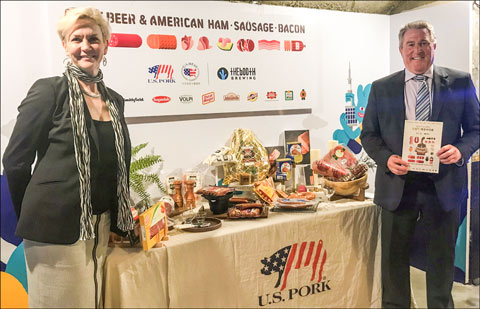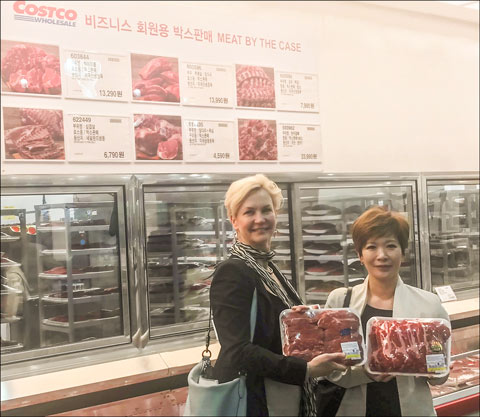



NAMI President Gets Firsthand Look at US Red Meat’s Success in Japan, Korea
JAPAN & SOUTH KOREA - Last week Julie Anna Potts, president and CEO of the North American Meat Institute (NAMI), made her first visit to two of the leading destinations for US beef and pork – Japan and South Korea.
Ms Potts was accompanied by USMEF President and CEO Dan Halstrom and participated in several consumer events, retail promotions and industry meetings arranged by USMEF.

She also received market briefings from US Embassy staff in Tokyo and Seoul.
"The consumer events in Tokyo were very exciting because I was able to interact with retailers and food bloggers, as well as the chefs who prepared US pork and beef," Ms Potts said.
"So those were excellent opportunities to talk directly to consumers and the retailers who supply them about what Japanese consumers look for in red meat products.
"I was very impressed with what USMEF is doing directly with consumers to grow demand and increase US market share."

Ms Potts also took note of the fierce competition US red meat faces in the Japanese market, which underscores the importance of the recently launched US-Japan trade agreement negotiations.
"NAMI is working very hard with the Trump administration to ensure that we move extremely quickly to get a trade agreement between Japan and the United States," she said.
"The uncertainty that’s created when other countries have trade agreements with Japan and the US does not is not a great place for us to be.
"So we must continue to reassure our trading partners that there is great emphasis on the importance of getting this agreement done as quickly as possible, and that the US industry continues to vigorously compete in the Japanese market."
In Korea, where US beef and pork exports have surged and red meat consumption is growing rapidly, the importance of market access was on full display.
"It’s incredibly important that we have working trade agreements with key markets such as South Korea," Ms Potts said.
"KORUS (the Korea-US Free Trade Agreement) is a great example of how the US industry can be much more competitive when we don’t have to deal with tariffs at such high levels."
In both Japan and Korea, Potts was very impressed with the merchandising of US beef and pork and the promotional efforts coordinated by USMEF staff.
"I just really loved seeing, in multiple retail locations, how beautifully our US beef and pork is presented," Ms Potts explained.
"What I observed in the stores was an incredible level of attention to packing and presentation and signage – things that are very, very important to the retail consumer.
"This drove home the importance of having experienced USMEF staff in these markets who really understand what works and who provide phenomenal service to our industry.
"I was very pleased to be able to see this in person so that I can speak more knowledgably about it when I’m doing advocacy work back in the United States."
Ms Potts said that while she has always valued the importance of trade, her time in Japan and Korea gave her a greater appreciation for the outstanding returns red meat exports deliver for the entire US supply chain.
"What we do in these markets, through USMEF, is incredibly important to the US industry,” she concluded.
"That cultural exchange, which I’ve now been able to witness firsthand, is just amazing."
TheCattleSite News Desk


